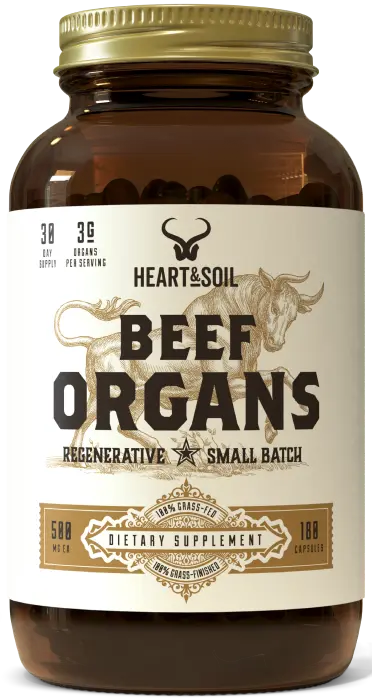- History and Recent Mainstream Popularity
- What is the Carnivore Diet
- What is the Animal-Based Diet
- Is Carnivore or Animal-Based Healthier?
- Who Should Eat Animal-Based?
If you’re in search of radical health… then you’re in the right place.
Today, we’re going to cover the differences between two of the most evolutionarily consistent diets that mankind has ever known – Carnivore and Animal-Based. Is one better than the other? Which one can fix the chronic health issues caused by the “Standard American diet”? Which one is healthier and more sustainable long-term?
History and Recent Mainstream Popularity
In recent years, both the Carnivore and Animal-based diets have gained massive popularity. The carnivore diet gained traction when Shawn Baker appeared on The Joe Rogan Experience Podcast in December 2017. Then, in October 2020, Dr. Paul Saladino appeared on the same podcast and dove deep into the evolutionary science of animal-based eating.
To some, these diets may seem new or “extreme”. But the truth is, these are the original human diets. They’ve been around since our ancestors (Australopithecus) began walking upright and hunting animals about 4 million years ago. Crazy right? 4 million years ago! Anyways, we could write an entire blog on the history of human diets, but we’ll save that one for another day.
Let’s dive in and compare…
What is the Carnivore Diet?
The Carnivore diet includes animal foods like meat, fish, eggs and sometimes dairy products like butter and hard cheeses. Of course, it also includes organ meats, but these nutrient-dense foods are often missing from most modern day carnivore diets. It excludes all plant foods like fruits, vegetables, legumes, grains, nuts and seeds. It’s a high protein, zero carb diet.
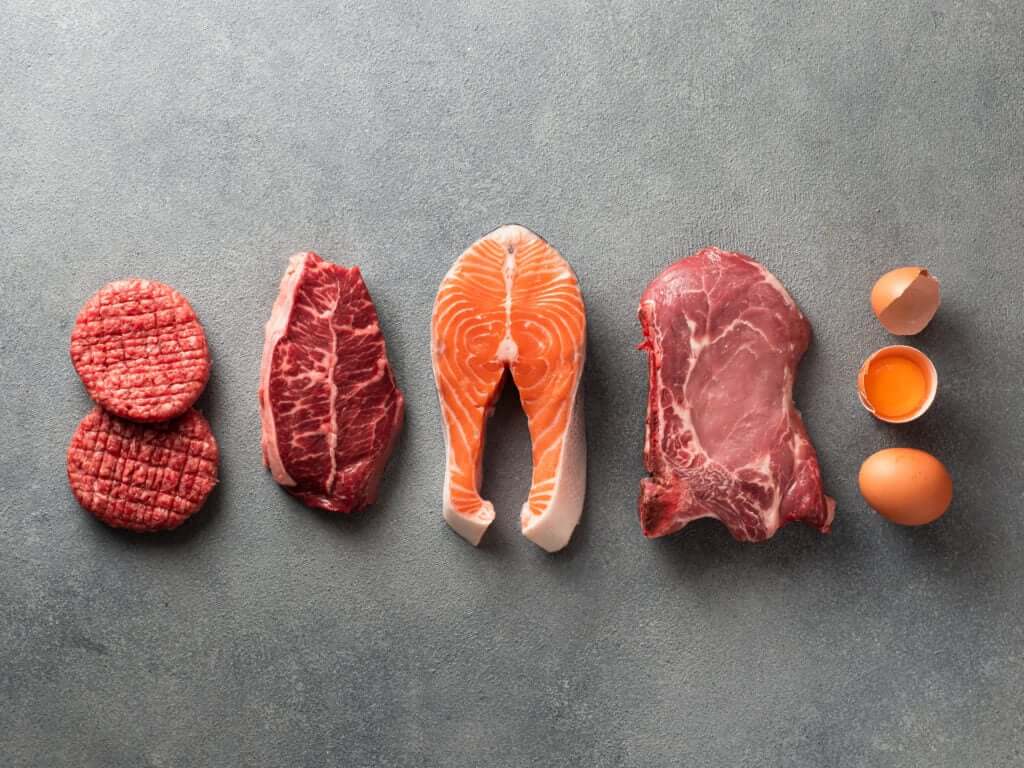
As you’ll learn shortly, the Carnivore diet exists within the Animal-based spectrum of eating. While it’s a much more extreme version of an animal-based diet, carnivore may suit different people at different times (more on this later).
What are the Benefits of the Carnivore Diet?
The most celebrated benefit of the Carnivore diet is weight loss, largely due to the elimination of processed sugars and seed oils. This weight loss is important because obesity itself can be a major source of inflammation in the body. Weight loss results in improved blood pressure, insulin sensitivity, improved inflammatory markers and overall health.
Plus, animal foods are incredibly nutrient-rich and high in saturated fats (*healthy fats), which are more satiating than the processed foods and sugars found in the ‘Standard American Diet’. This means it’s difficult to overeat when eating animal foods.
Other benefits of the carnivore diet include:
- Improved mood and mental clarity
- More energy
- Improved libido
- Elimination of many autoimmune diseases
What are the Issues with the Carnivore Diet?
As we’ve discussed, the carnivore diet can have many benefits in the short term. However, most people may begin to experience issues in the long term; particularly electrolyte issues related to long term ketosis due to the absence of carbohydrates. If you eat carnivore for a prolonged period of time you may experience issues like:
- Muscle cramping
- Heart palpitations
- Sleep disturbances
- Hormonal disruption
So, how do we fix these issues? Easy… carbohydrates! (keep reading to the animal-based section to learn more about the importance of carbohydrates).
We also commonly see non-health related issues on the carnivore diet:
- Social conformity and the need to compromise your diet in social situations
- Boredom due to limited foods
- Too strict (all of us need variety once in a while!)
What is the Animal-Based Diet?
An animal-based diet begins with a focus on nose-to-tail animal foods; primarily meat and organs. These are the most evolutionarily consistent and bioavailable foods for humans. From there, we add in other foods that our ancestors have cherished for millions of years, like fruit, honey and raw dairy. That’s it. Animal-based is simple, nourishing, and most importantly, these are the foods our DNA expects us to eat in order to thrive.
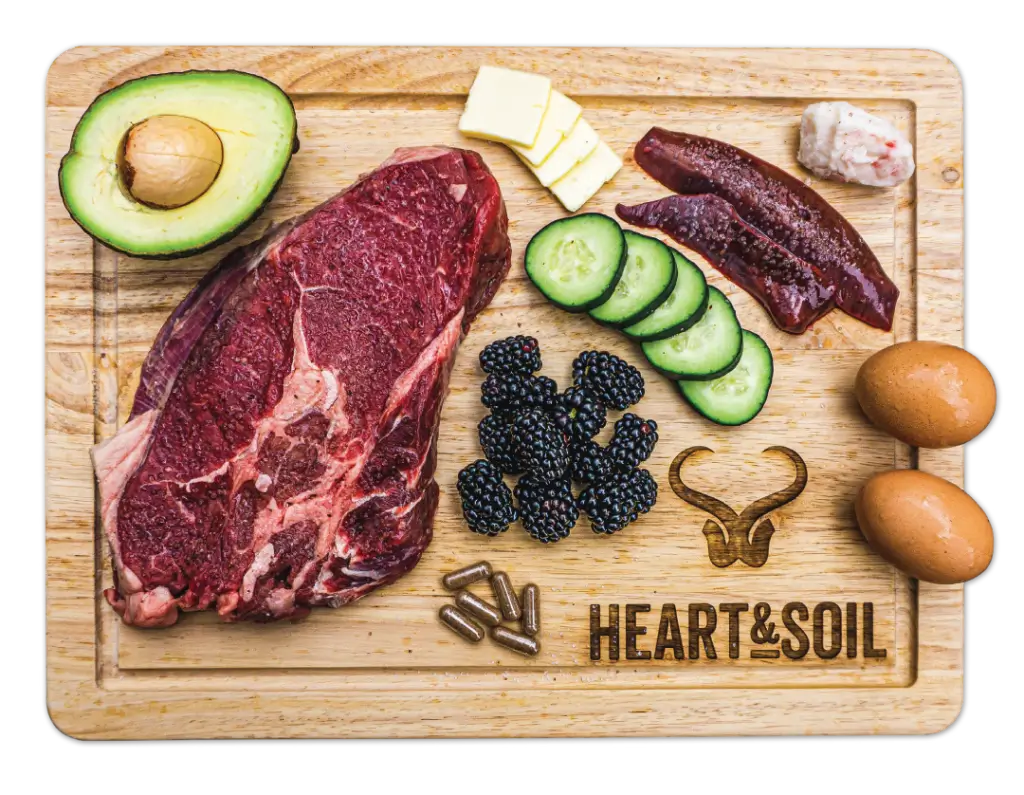
Foods to Avoid on an Animal-Based Diet
An animal-based diet does not include foods that may be harmful to humans, like seed oils, processed sugars, and even certain vegetables which contain plant defense chemicals.
As a general rule, when it comes to vegetables you should avoid leaves, stems, roots and seeds. Use the plant toxicity scale below as a guide to plant foods.
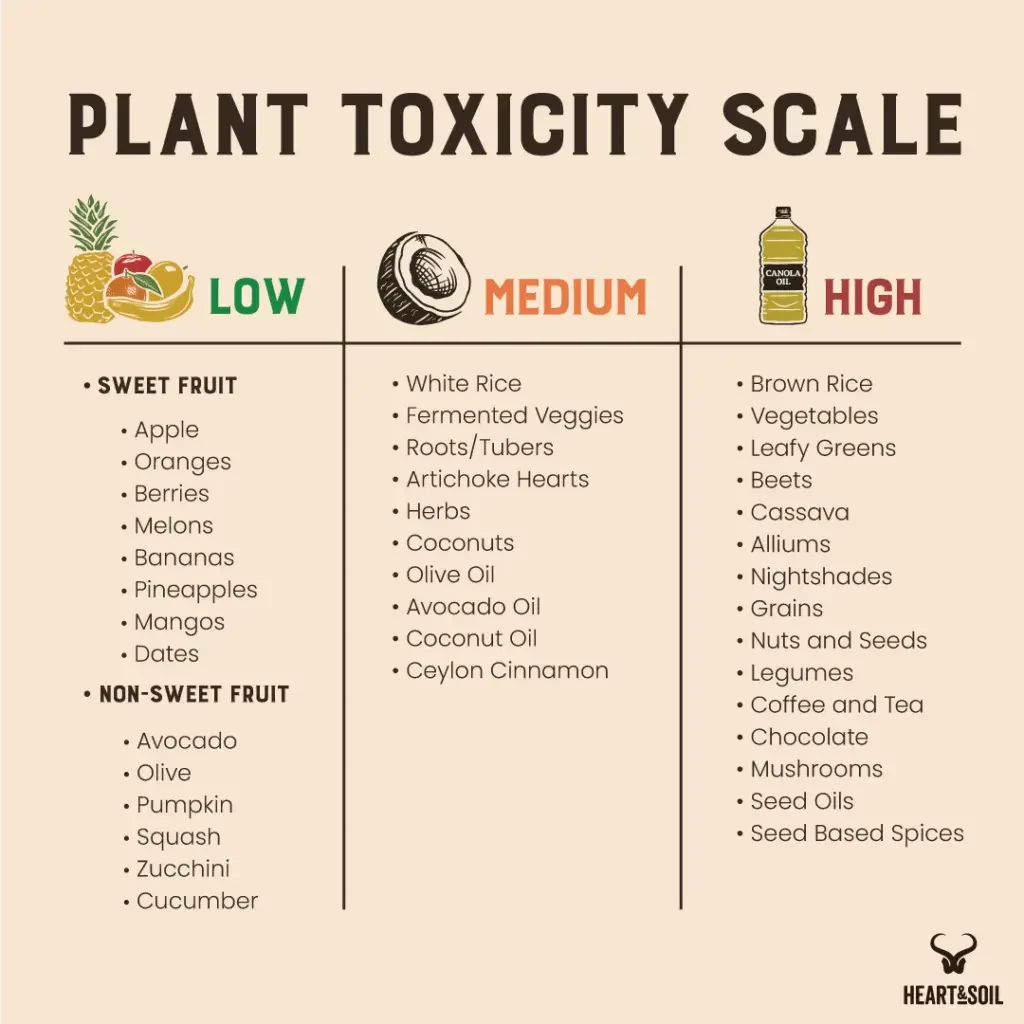
Why are some parts of the plant more toxic than others?
Think about it from an evolutionary perspective. When faced with danger, animals can run or fight. Plants can’t do either. What defense do they have? Over time plants developed varying degrees of defense chemicals in their leaves, stems, roots and seeds to protect them from being eaten.
In a 1990 research paper “Dietary Pesticides 99.99% all natural”, researchers “calculate that 99.99% (by weight) of the pesticides in the American diet are chemicals that plants produce to defend themselves. Only 52 natural pesticides have been tested in high-dose animal cancer tests, and about half (27) are rodent carcinogens; these 27 are shown to be present in many common foods. When plants are stressed or damaged, such as during a pest attack, they may greatly increase their natural pesticide levels, occasionally to levels that can be acutely toxic to humans.”
However, while most parts of plants are not meant to be eaten, they still need to reproduce, right? Right! That’s why their fruit has far less defense chemicals, is sweet, and is meant to be eaten. When animals eat the fruit, they spread the seeds contained within the fruit, allowing the plant to reproduce.
As important as it is to eat healthy animal-based foods (meat, organs, fruit, honey and raw dairy), it’s just as important to eliminate the foods we’ve adopted in the last 100 years that are wreaking havoc on our bodies.
What are the Benefits of an Animal-Based Diet?
The most common benefits from eating an animal-based diet are weight loss, improved blood pressure and insulin sensitivity, and general health and well-being.
Additional benefits that we commonly see are:
- Elimination or improvement of autoimmune conditions
- Improved mood and mental clarity
- Increased energy
- Improved libido
- Better body composition
- Higher quality sleep
- Improved gastrointestinal issues
Each benefit listed above is due to returning to eating the way nature intended.
Afterall, the animal-based diet contains the foods that humans have treasured for thousands of years, which have allowed our ancestors to live a life of radical health and vitality – free from chronic disease. It’s only in the past century that conditions like obesity, autoimmune diseases, heart disease, and diabetes have not only skyrocketed, but sadly have become an accepted fact of life for so many.
But as we learned today – it doesn’t have to be that way.
You can reclaim your birthright to radical health by eliminating harmful foods and eating more animal-based foods like meat, organs, fruit, honey and raw dairy.
Beef Organs
Nature's Ultimate Multivitamin
Is Carnivore or Animal-Based Healthier?
Here’s what most people won’t tell you: carnivore and animal-based are both healthier than most modern diets. However, we believe that animal-based eating is the most complete diet for the far majority of people.
On the other hand, while the carnivore diet exists within the animal-based spectrum of foods, there are a few deficiencies in the carnivore diet that can cause problems in the long term. Let’s dive in and compare the two…
What are the Similarities Between Carnivore and Animal-Based?
The main similarity between Carnivore and Animal-based is that each diet is centered around animal proteins. Additionally, fats are viewed favorably and come from many of the same sources (fatty meats, tallow, butter, ghee and suet – to name a few).
What are the Differences Between Carnivore and Animal-Based?
While both diets have similarities and are founded on similar principles, the differences are what cause most people to choose animal-based long term. For instance, the core difference is how animal-based eaters view carbohydrates. Carbs are key to many bodily functions. It’s why most carnivore eaters seem to arrive at an animal-based diet as their ‘final destination’ after reintroducing carbs to their diet.
*It’s worth noting that depending on the season, our ancestors spent significant amounts of time eating strictly carnivore when fruits were hard to come by.
Below is the Animal-based Food Pyramid. As you can see, this could easily be a Carnivore food pyramid if the top section (carbs) were excluded.
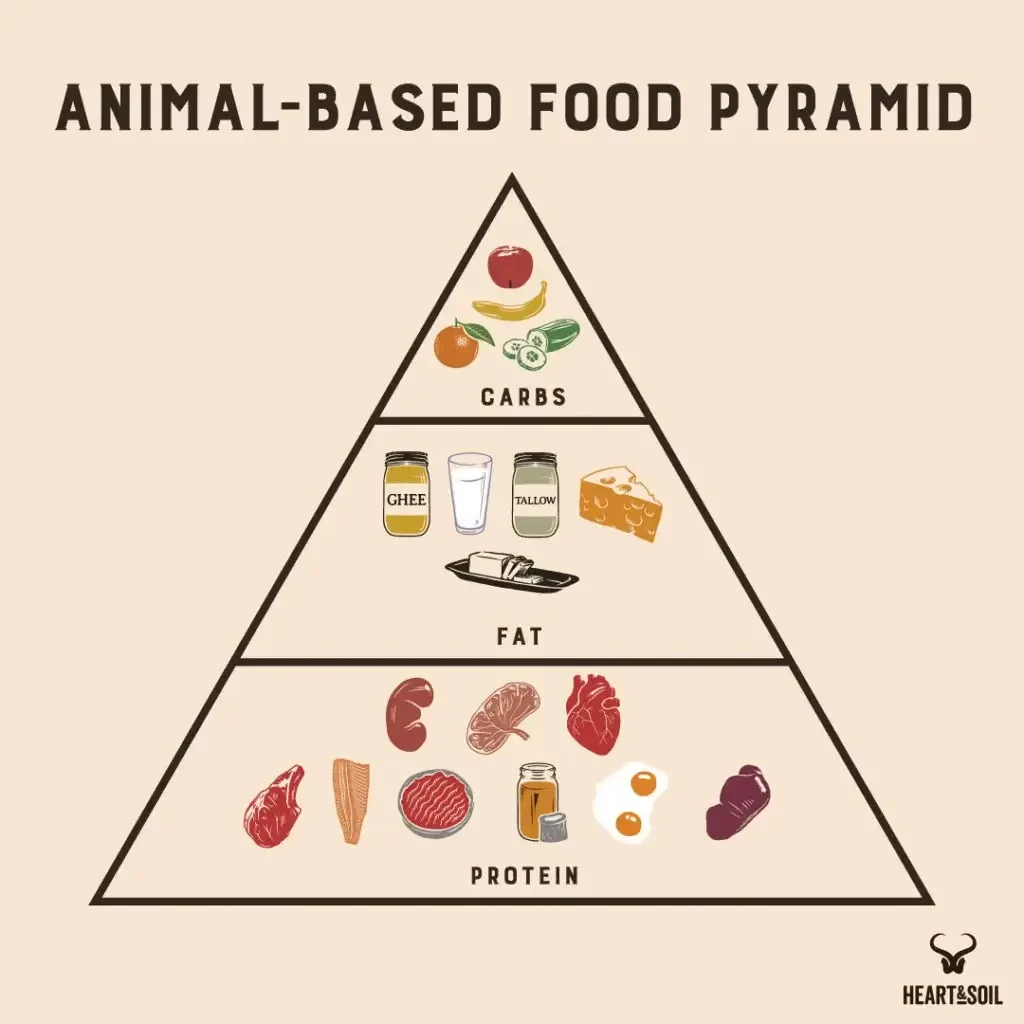
Can you see how Carnivore exists within the Animal-based spectrum of foods?
When is it OK to Eat Strictly Carnivore?
This may surprise you, but there are times when a strict Carnivore diet may benefit some people with specific health issues or goals:
- Elimination diet: if you’re trying to determine which foods create certain negative reactions in your body, oftentimes the best way to uncover the issue is by eating strictly carnivore, then slowly introducing foods back into your diet, one by one.
- Hyperglycemic Issues, like metabolic dysfunction, diabetes, and pre-diabetes: if you’re unable to eat carbs like fruit, honey or maple syrup.
- Severe Autoimmune skin or Joint Issues: if you suffer from severe autoimmune conditions like rheumatoid arthritis, psoriasis, or vitiligo and have exhausted all other options… a carnivore diet may be the only thing that works.
Ultimately, we view the Carnivore diet as a medically therapeutic diet. Is carnivore optimal for most people long term? No. But for some, it can be a great tool to use against debilitating autoimmune diseases. If you fall into this group, there’s still light at the end of the tunnel. You may get to a point where you can begin to introduce some low toxicity carbohydrates (like fruits) – but the timeline can range dramatically from one person to the next.
Who Should Eat Animal-Based?
Short answer: everyone.
The truth is, eating animal-based is how our ancestors have eaten for thousands of years. It’s no surprise that most modern dieters all find their way to an animal-based diet eventually. Vegan, vegetarian, pescatarian, keto, paleo, carnivore… they all have their deficiencies, and with those deficiencies can come health issues.
Animal-based is satiating, it keeps your body functioning at the highest level, and it’s sustainable – forever. The best part is, the food tastes great and its simplicity is refreshing. Say it with us… “meat, organs, fruit, honey and raw dairy.”
That’s a wrap!
If this blog was helpful, please share it with a friend!
As always, feel free to reach out to our Health Success Team if you have any personalized health questions.

By the way, if you enjoy learning about the science behind your health pursuits (like us🤓 ), then you’ll love this Youtube video of our Founder, Dr. Paul Saladino, covering “everything you need to know about starting an animal-based diet.” Or if you prefer audio-only podcasts, listen here.
Grass-Fed Whey Protein for Muscle Recovery
1 Ingredient. 24 Grams of Protein.
Subscribe to future articles like this:
